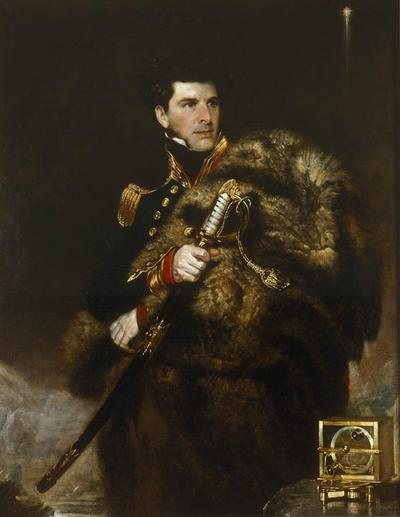- James Clark Ross
Infobox Person
name = James Clark Ross
image_size = 150px
caption = Sir James Clark Ross beside him is adip circle designed by Robert Were Fox, and used by Ross to discover the magnetic south pole.
birth_name =
birth_date =April 15 ,1800
birth_place =London
death_date =April 3 ,1862
death_place =
death_cause =
resting_place =
resting_place_coordinates =
residence =
nationality = British
other_names =
known_for =Antarctica
education =
employer =
occupation =
home_town =
title =
salary =
networth =
height =
weight =
term =
predecessor =
successor =
party =
boards =
religion =
spouse =
partner =
children =
parents =
relatives =
website =
footnotes =Sir James Clark Ross (
April 15 ,1800 –April 3 ,1862 ), was a British naval officer and explorer. He explored theArctic with his uncle Sir John Ross and Sir William Parry, and later led his own expedition toAntarctica .Arctic explorer
Ross was born in London. He entered the navy in 1812 under his uncle, whom he accompanied on Sir John's first Arctic voyage in search of a
Northwest Passage in 1818. Between 1819 and 1827, Ross took part in four Arctic expeditions under Parry, and in 1829 to 1833, again served under his uncle on Sir John's second Arctic voyage. It was during this trip that they located the position of theNorth Magnetic Pole onJune 1 ,1831 on theBoothia Peninsula in the far north of Canada. It was on this trip, too, that Ross charted the Beaufort Islands, later renamedClarence Islands by his uncle. [cite book |last=Bossi |first=Maurizio |authorlink= |coauthors=Gabinetto scientifico letterario G.P. Vieusseux |url=http://books.google.com/books?id=M1izJwICQ2kC&pg=PA571&lpg=PA571&dq=%22Clarence+Islands%22+%22king+william%22&source=web&ots=ZYYX-3lxcZ&sig=h5eBVFnLDsGEA-NLC84zkSDyf4M&hl=en#PPA571,M1 |title=Notizie di viaggi lontani : l'esplorazione extraeuropea nei periodici del primo Ottocento, 1815-1845 |year=1984 |publisher=Guida |location=Naples |isbn=8870423999] [cite book |last=Woodman |first=David C. |authorlink= |coauthors= |url=http://books.google.com/books?id=RbnvSlOc6twC&pg=PA75&lpg=PA75&dq=%22Clarence+Islands%22+-elephant+&source=web&ots=zdDXRbYpc7&sig=SnNsRyMCPfFT3hQijcRURS8wsEw&hl=en#PPA75,M1 |title=Unravelling the Franklin disaster : Inuit testimony |year=1991 |publisher=McGill-Queen's University Press |location=Montreal |isbn=0773508333]In 1834, Ross was promoted to captain, and from 1835 to 1838, he was employed on the magnetic survey of
Great Britain .Antarctic explorer
Between 1839 and 1843, Ross commanded an Antarctic expedition comprising the vessels HMS "Erebus" and HMS "Terror" and charted much of the coastline of the Antarctic continent. Also aboard was
Joseph Dalton Hooker who had been invited along as assistant surgeon. "Erebus" and "Terror" werebomb vessel s - an unusual type of warship named after the mortar bombs they were designed to fire and constructed with extremely strong hulls, to withstand the recoil of the mortars, which were to prove of great value in thick ice.In 1841, James Ross discovered the
Ross Sea ,Victoria Land , and the volcanoesMount Erebus and Mount Terror, which were named for the expedition's vessels. They sailed for convert|250|mi|km along the edge of the low, flat-topped ice shelf they called the Victoria Barrier, later named "Ross Ice Shelf " in his honour. In the following year, he attempted to penetrate south at about 55°W, and explored the eastern side of what is now known asJames Ross Island , discovering and namingSnow Hill Island andSeymour Island . It is noteworthy that Ross reported thatAdmiralty Sound was blocked by glaciers at its southern end, providing evidence for a much greater extent for the ice-shelves inPrince Gustav Channel and the northernLarsen Ice Shelf .On his return, Ross was knighted, and was also nominated to the French order of the
Legion d'Honneur . In 1847, he published his account of the expedition under the title of "A Voyage of Discovery and Research to Southern and Antarctic Regions". He was elected to theRoyal Society in 1848, and in that year made his last expedition, as captain of HMS "Enterprise", accompanied by HMS "Investigator", [cite book |title=Ordeal by ice; the search for the Northwest Passage |last=Mowat |first=Farley |authorlink= |coauthors= |year=1973 |publisher=McClelland and Stewart Ltd |location=Toronto |format=The Vanished Ships |pages=250 |oclc=1391959] in the first expedition in search of Sir John Franklin.James was married to Lady Ann Ross. He died at
Aylesbury in 1862, five years after his wife. Ablue plaque marks Ross's home in Eliot Place, Blackheath, London.Tributes
*James Clark Ross is the name of a
British Antarctic Survey ship.
*Ross crater on theMoon is jointly named for him andFrank Elmore Ross .References
* "The Royal Navy in Polar Exploration From Frobisher to Ross" - E C Coleman - 2006 ISBN 0-7524-3660-0
* "The Royal Navy in Polar Exploration From Franklin to Scott" - E C Coleman - 2006
Wikimedia Foundation. 2010.
